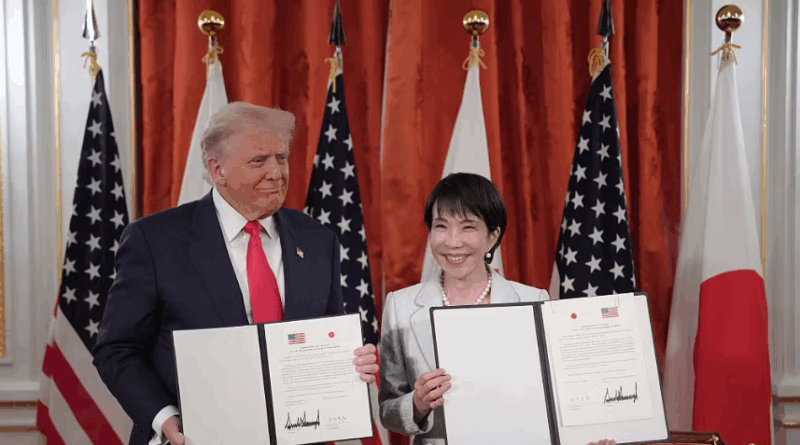Trump Secures $550 Billion U.S.–Japan Investment Pact, Rare Earth Deal to Undercut China’s Grip
President Donald Trump and Japanese Prime Minister Sanae Takaichi unveiled a sweeping economic and national security pact Tuesday that includes a rare earth minerals agreement and a massive $550 billion investment plan aimed at bolstering the U.S. economy and cutting China out of critical supply chains.
The deal, signed during Trump’s state visit to Japan, formalizes a bilateral commitment to stockpile rare earth elements and jointly protect the fragile supply chain of minerals essential to everything from semiconductors and AI to nuclear power and military hardware. The pact is a direct shot at Beijing’s dominance over the global rare earth market — and a major win for the Trump administration’s “America First” industrial policy.
“This Is About Economic Security,” Trump Says
Standing alongside Prime Minister Takaichi, Trump made clear the stakes. “We’re not just talking about minerals,” he said. “We’re talking about national security, industrial dominance, and the future of our economies. This agreement is about freedom — economic freedom from Communist China.”
Commerce Secretary Howard Lutnick said the rare earth agreement and investment announcements represent the first phase of a larger strategic alliance. “This is the launch phase,” he said, confirming that Japan’s $490 billion initial investment will grow to $550 billion over time. “These are not theoretical deals. These are shovel-ready projects.”
Japanese Investment to Fuel U.S. Nuclear, AI, Auto Sectors
Key highlights of the investment package include:
-
$100 billion for nuclear energy development, focused on building full-scale and small modular nuclear reactors inside the United States, with participation from Japanese industry giants like Mitsubishi Heavy Industries, Toshiba, and IHI. Westinghouse will lead the U.S. side of the effort.
-
Another $100 billion for small modular reactor expansion, funded jointly by Japanese energy companies.
-
$30 billion from Mitsubishi Electric to build and supply infrastructure for the U.S. power grid, including generators, transmission systems, and AI-integrated control equipment for next-generation data centers.
-
$15 million from Panasonic to boost U.S. supply chains for energy storage and electronic components.
-
$10 billion from Toyota for expanded U.S. auto manufacturing facilities, though that figure was not included in the official government handout. Trump said the investment came up during his meeting with Takaichi and ties into Japan’s interest in the U.S. AI manufacturing boom.
“These are great companies, many of them household names,” Lutnick said. “They’re building infrastructure that will reshape the American economy for generations.”
Trump’s Tariffs Deliver Results
The investments stem from a July trade agreement in which Trump slashed tariffs on Japanese auto imports from 27.5% to 15%. In exchange, Japan committed to invest hundreds of billions into U.S. industries over the next decade.
Trump credited his tough tariff stance for getting results. “It’s because of November 5th. It’s also because of tariffs,” he told U.S. troops stationed in Japan. “They know America is open for business — on our terms.”
A United Front Ahead of China Meeting
Tuesday’s announcement comes just days before Trump is set to meet with Chinese Communist Party leader Xi Jinping in South Korea. With tensions over rare earths, trade, and digital infrastructure at a boiling point, the Japan deal sends a powerful signal: America is not waiting on Beijing.
The rare earth agreement allows the U.S. and Japan to pool resources and work with trusted international allies to secure mineral supplies and limit China’s ability to choke the global market.
Bottom Line: America First Goes Global
With the stroke of a pen, Trump delivered a dual victory — crippling China’s stranglehold over critical minerals while unleashing one of the largest foreign investment packages in U.S. history.
The rare earth pact and $550 billion investment surge aren’t just economic moves — they’re a strategic offensive in the fight to reshape the global order on America’s terms.

